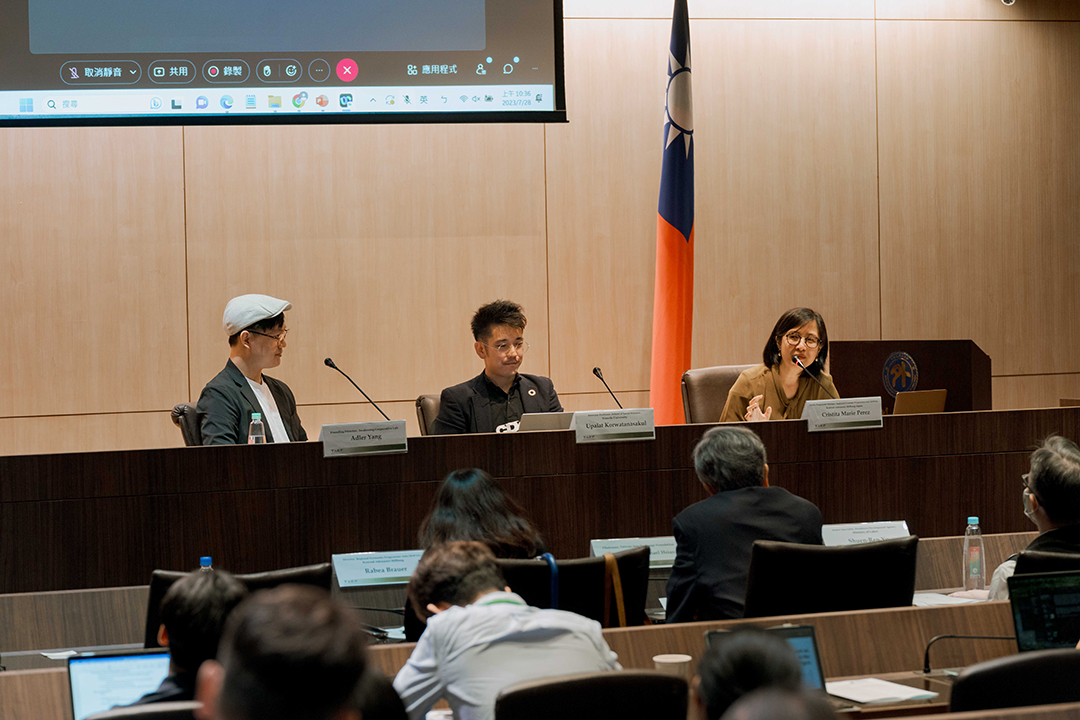The future has never been certain for anyone. However, when it comes to the future of work for young people today, the picture is much harder to paint with new skill demands born out of technological advancement, new challenges left behind by the COVID-19 pandemic, and conventional education that may have not been preparing the young people for the said new fronts.
Given these realities, the Taiwan-Asia Exchange Foundation (TAEF) once again joined hands with Konrad-Adenauer Stiftung's (KAS) Regional Economic Programme (SOPAS) in hosting a panel today on the Future of Work (FOW) research series at the Institute of Diplomacy and International Affairs.
Building on their collaboration which has investigated young people’s work prospects in Indonesia, Malaysia, Vietnam, and Taiwan, this year’s conference was set to discuss the topic from a regional, Asian perspective under the theme: Responding to the Dynamic Changes in the World of Work in Asia. More notably, it was the first physical FOW conference held by both organizations since their collaboration started in 2020.
The session was commenced by Chairman Hsin-Huang Michael Hsiao of TAEF and Director Rabea Brauer of SOPAS.
In his remarks, Dr. Hsiao emphasized that it's hard to paint a one-size-fits-all picture of the Asian youth's work scene, but this diversity of Asian youth can also be a resource of fresh viewpoints. These viewpoints will be exchanged by today's group of young delegates who come from different parts of Asia. Hopefully, by the end of the conference, they can generate a line of policy advocacies worth putting forth for each country.
Ms. Brauer remarked that KAS has an extensive network of offices around the world and always seeks to engage with youth groups from every country. No matter where young people are located, KAS aims to be a pillar of support in their network for success.
The conference also welcomed Shuen-Ren Yu, Senior Specialist at the Workforce Development Agency of the Ministry of Labor in Taiwan, to deliver a keynote on "Taiwan Employment Promotion for Youth." He highlighted that the Taiwan government has invested a lot of resources in career guidance assistance for youth, such as campus campaigns, employment service stations, both online and physical service centers, etc.
The conference then followed into the panel, where three expert panelists were invited to contribute their insights on how academia, the private sector, and the government can help create the necessary environment to prepare young people for the dynamic changes happening in the workplace, the labor market, and society.
Riccardo Corrado, Assistant Professor and Chair of the ICT Program at the American University of Phnom Penh in Cambodia, viewed the employment problems today's youth face as lying in the gap between what the school system prepares students for the job market and the skills that corporates really need. To tackle such problem, every country has its own solutions. For example, Cambodia has implemented lots of policies and frameworks for industry innovation and education, but they still face the challenge of a fast-growing economy with part of the youth workforce coming from underprivileged backgrounds.
Upalat Korwatanasakul, Associate Professor of the School of Social Sciences at Waseda University, approached the discussion from the health and geopolitical perspective. He indicated that youth employment in recent years was closely linked with health issues (Covid-19) and geopolitical factors. The youth sector of the labor market is the one most impacted by the pandemic. Vulnerability and uncertainty are the biggest challenges today's youth are facing and also what they should prepare before entering the job market.
Adler Yang, Founding Director of Awakening Cooperative Lab, stressed that today we are confronted with the dilemma between "the universe (natural conditions) and the metaverse (artificial technology)." Young employment has not only been affected by the pandemic but also by new technology, which many believe will replace human job positions. Thus, how to utilize the technology for our work or career but not being replaced is a challenge today's youth have to confront.
Dr. Alan H. Yang, Executive Director of TAEF closed the conference by indicating SEASAT Youth Camp keeps the tradition of comparing country profile and for the young participants to come out with policy advocacies for related stakeholders. TAEF believes by conveying these advocacies to the policy makers, it will gradually make job market more friendly to the youth.
About TAEF
Founded in 2018, the Taiwan-Asia Exchange Foundation (TAEF) is the first policy-oriented think tank in Taiwan focusing on Southeast Asian and South Asian affairs. In the spirit of the New Southbound Policy (NSP), the goal of the TAEF is to promote comprehensive ties between Taiwan and the 10 ASEAN countries, 6 South Asian states, as well as Australia and New Zealand through cooperation and exchanges in three major fields – including think tanks, non-governmental organizations (NGOs) and young leaders – to consolidate a sense of regional community in Asia and establish long-term cooperative partnerships. For more information, please visit TAEF’s website.
About KAS
Founded in 1955, the Konrad-Adenauer-Stiftung (KAS) is a political foundation that connects influential leaders in government, business, academia and beyond through over 100 offices across the world. Meanwhile, KAS Regional Economic Programme Asia (SOPAS) is a regional forum that brings together a network of policymakers, economists, political analysts, and thought leaders across Asia to discuss emerging issues, propose policy alternatives, and share best practices. For more details, please visit KAS’s website.
